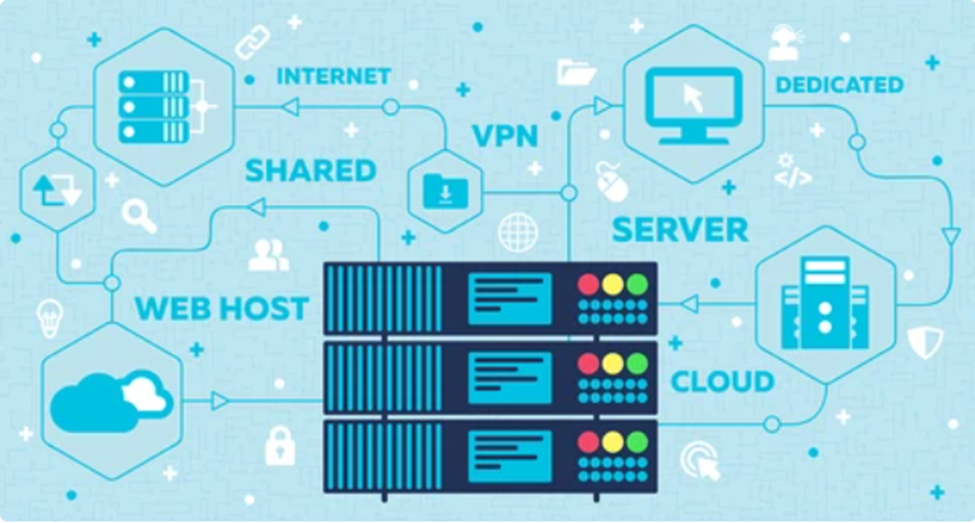Dedicated Web Hosting Services: Are They Worth It?

In today's digital landscape, businesses and individuals increasingly rely on websites for marketing, communication, sales, and customer engagement. With the growing dependence on online platforms, web hosting services have become an integral part of maintaining a website. From personal blogs to complex e-commerce platforms, choosing the right web hosting solution can significantly impact a website's performance, security, and overall user experience.
Among the different web hosting options available, dedicated web hosting services stand out for their advanced capabilities and high-performance features. But are they really worth it for everyone? In this article, we'll dive into what dedicated web hosting is, who needs it, its benefits, and alternatives, and help you determine if this option aligns with your needs.
What is Dedicated Web Hosting?
Dedicated web hosting refers to a web hosting service where an entire physical server is dedicated exclusively to a single client. Unlike shared hosting, where resources like storage, bandwidth, and processing power are shared among multiple users, dedicated hosting service provides complete control over the server's resources.
With dedicated hosting, the user or business gets a full server to themselves, which can be customized, configured, and managed according to specific needs. Dedicated servers are typically housed in data centers with high-speed internet connectivity, redundant power supplies, and robust security protocols. These servers come with full administrative access, which means you can install software, run custom applications, and optimize configurations without the restrictions imposed by shared hosting services.
Types of Dedicated Web Hosting-
There are different types of dedicated hosting services available, each catering to varying business needs:
1. Managed Dedicated Hosting: In this type of hosting, the web hosting service provider takes care of all aspects of the server, including monitoring, updates, security, backups, and troubleshooting. Managed hosting is ideal for businesses that don’t have in-house IT teams or technical expertise and want to focus on their core business operations.
2. Unmanaged Dedicated Hosting: With unmanaged hosting, you are responsible for maintaining and configuring the server yourself. You will have full access to the server's resources, but the onus of managing software updates, security patches, and server performance is on you. This option is suitable for advanced users or businesses with dedicated IT staff.
3. Semi-Managed Dedicated Hosting: As the name suggests, semi-managed hosting is a middle ground between managed and unmanaged hosting. In this case, the web hosting provider may handle certain tasks like basic server setup and network management, while you retain control over more technical aspects of the server.
Who Needs Dedicated Hosting?
Dedicated web hosting isn't for everyone. It's generally suited for businesses and individuals who require greater control over their server environment and need resources that shared hosting or VPS (Virtual Private Servers) simply can't provide. Here are some instances where dedicated hosting might be the right choice:
1. High Traffic Websites: Websites that experience a high volume of traffic, such as large e-commerce stores, news sites, or online communities, can benefit from dedicated hosting. Since resources aren’t shared with other users, these websites are less likely to experience slowdowns or performance issues during traffic spikes.
2. Data-Intensive Applications: If you run applications that require significant amounts of data processing, such as video streaming services, large-scale databases, or complex web applications, a dedicated server provides the computing power and resources needed for smooth operation.
3. Security Concerns: Websites handling sensitive data, like financial information, personal customer details, or healthcare data, can benefit from dedicated hosting’s enhanced security features. With dedicated hosting, you can implement custom security measures, firewall configurations, and monitoring systems that cater to your specific security needs.
4. Customization Needs: If you need complete flexibility in your server setup, custom software installations, or specific configurations, dedicated hosting allows you to configure the server as per your exact requirements.
5. Business Applications: Enterprises that run mission-critical business applications, such as Customer Relationship Management (CRM) systems, Enterprise Resource Planning (ERP) software, or content management systems (CMS), can benefit from the stability, reliability, and performance provided by dedicated hosting.
Benefits of Dedicated Web Hosting-
1. Superior Performance and Speed
One of the most compelling reasons to choose dedicated hosting is the guaranteed performance. With dedicated hosting, you don’t have to share resources with anyone else. This means faster load times, higher bandwidth, and more storage. Websites hosted on dedicated servers are less likely to experience slowdowns during high traffic periods, offering a more seamless experience for visitors. Businesses that rely on fast-loading websites to generate sales or lead conversions can benefit from the speed boost that dedicated hosting offers.
2. Full Control and Customization
Unlike shared hosting, where you are restricted to certain configurations, dedicated hosting provides you with full root access to the server. This means you can install any software or application that suits your needs, configure custom server settings, and tailor the server environment to your specifications. Whether you need specific server-side scripts or the ability to modify the server’s architecture, dedicated hosting gives you the freedom to do so.
3. Enhanced Security
Security is a top priority for websites, especially those that store sensitive information. Dedicated hosting offers stronger security protocols compared to shared hosting. Since you have full control over the server, you can configure advanced firewall settings, implement custom security measures, and ensure the server is protected against potential threats. In addition, dedicated hosting providers often offer enhanced DDoS (Distributed Denial of Service) protection and regular security updates to safeguard your data.
4. Scalability and Flexibility
As your business grows, so will your web hosting needs. Dedicated servers provide scalability that can accommodate increased traffic, higher storage needs, and more complex applications. Unlike shared hosting, where resources are fixed, a dedicated server can be upgraded with additional CPU, RAM, or storage as your website’s requirements change. This makes dedicated hosting a more future-proof solution for growing businesses.
5. Reliability and Uptime
Dedicated hosting providers typically offer a higher level of reliability and uptime than shared hosting providers. With a dedicated server, you don't have to worry about other websites on the same server consuming all the resources, which could result in your website going offline or experiencing performance issues. Hosting companies offering dedicated servers often have strong service level agreements (SLAs), guaranteeing uptime of 99.9% or higher.
6. Better Customer Support
Since dedicated hosting is a premium service, providers often offer more personalized and advanced customer support. Whether you're running a mission-critical website or need expert assistance to resolve server issues, dedicated hosting often comes with 24/7 customer support from experienced technicians who specialize in server management.
Evaluating Alternatives to Dedicated Hosting-
Before committing to a dedicated hosting plan, it’s important to consider whether alternatives might better suit your needs. While dedicated hosting offers significant advantages, there are several other hosting options that may be more cost-effective or appropriate for your website’s requirements.
1. Shared Hosting
Shared hosting is the most basic and affordable hosting option. With shared hosting, multiple websites share a single server’s resources, including CPU, memory, and bandwidth. This is an excellent option for personal blogs, small websites, or businesses that don’t expect high traffic. However, shared hosting often comes with limitations in terms of performance, security, and customization. Websites hosted on shared servers are vulnerable to performance issues caused by other websites on the same server.
2. Virtual Private Server (VPS) Hosting
VPS hosting offers more resources and control than shared hosting, while still being more affordable than dedicated hosting. In VPS hosting, a single physical server is divided into multiple virtual servers, each with its own resources. VPS hosting provides a good balance of performance, customization, and cost. While VPS hosting is ideal for websites that outgrow shared hosting but don’t need the full power of a dedicated server, it can still have performance issues during high traffic spikes or resource-heavy tasks.
3. Cloud Hosting
Cloud hosting is a scalable hosting solution that utilizes multiple servers in a network (the “cloud”) to host websites. Cloud hosting offers significant flexibility in terms of resource allocation and is often priced based on usage rather than a fixed plan. This makes cloud hosting an attractive option for businesses that experience fluctuating traffic or require rapid scalability. While cloud hosting doesn’t offer the same level of control as dedicated hosting, it’s a great alternative for businesses that want a balance between performance and cost.
4. Managed WordPress Hosting
For businesses running WordPress websites, managed WordPress hosting can be an excellent option. Managed WordPress hosting providers offer specialized infrastructure and services tailored to WordPress, such as automated backups, security updates, and optimized server environments. While this option doesn’t offer the same level of control as dedicated hosting, it is often sufficient for WordPress-centric websites, and it simplifies maintenance tasks, making it a good alternative for users who want a hands-off approach.
Is Dedicated Web Hosting Worth It?
Dedicated web hosting is a powerful solution that offers unmatched performance, security, and customization. For high-traffic websites, businesses with specific technical requirements, or those that require robust security measures, dedicated hosting is definitely worth considering. However, for small businesses or personal websites with modest needs, the costs and technical expertise required may make other hosting options, like shared or VPS hosting, more appropriate.
Ultimately, the decision of whether dedicated hosting is worth it depends on your website’s needs, traffic volume, security concerns, and your ability to manage or afford a dedicated server. If you need the performance, control, and reliability that come with a dedicated server, it can be a valuable investment for your online presence. However, if your website doesn’t require that level of power and flexibility, other hosting options might provide better value for your money.
Note: IndiBlogHub features both user-submitted and editorial content. We do not verify third-party contributions. Read our Disclaimer and Privacy Policyfor details.
















